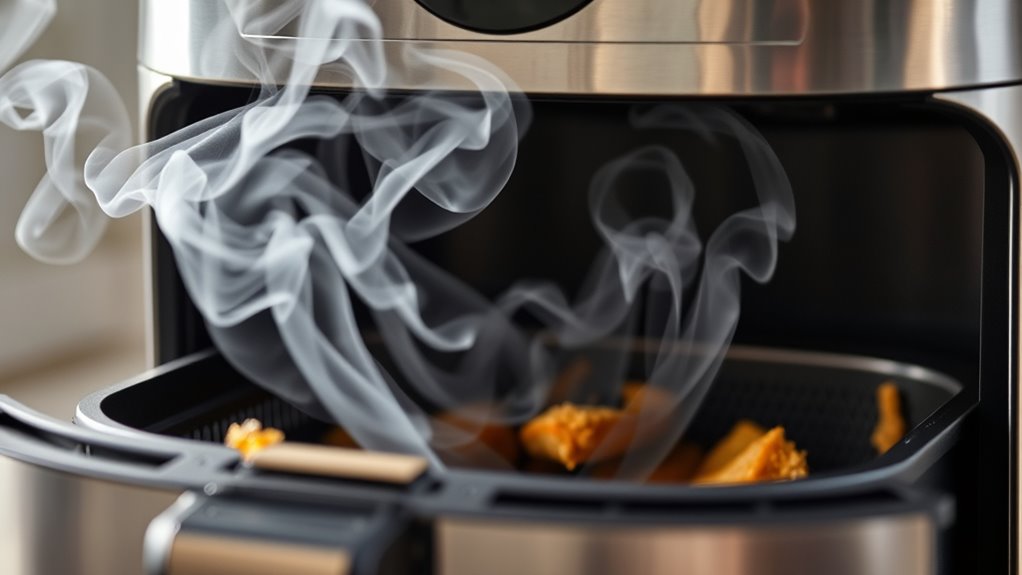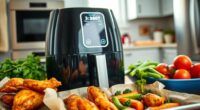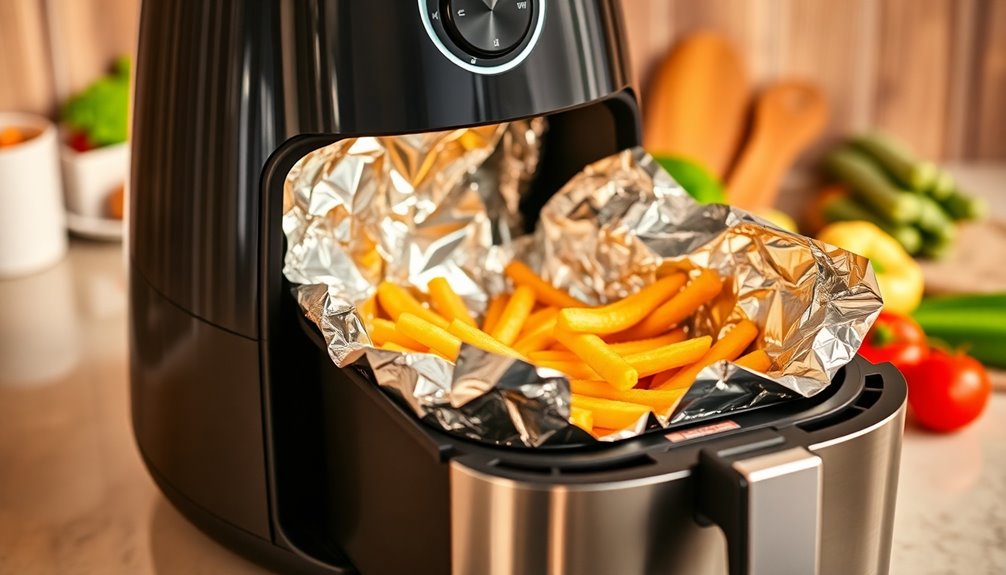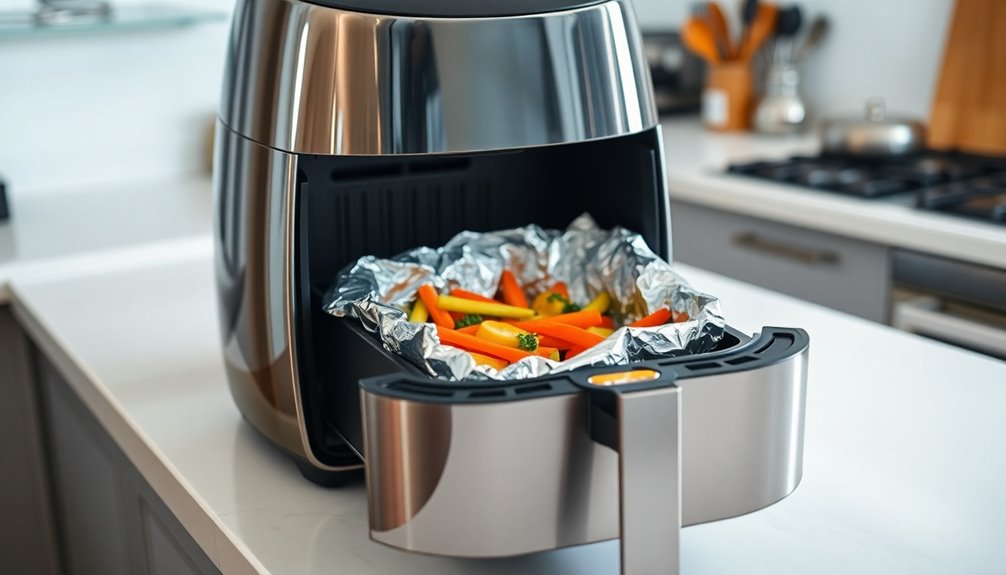If your air fryer is smoking, it’s likely due to residue buildup from grease, oil, or food particles that haven’t been cleaned properly. Overcrowding the basket or using incompatible accessories can block airflow or cause food to burn. Damaged heating elements or vents may also generate smoke. Regular cleaning and proper use can prevent this, but there are other causes worth checking as well—continue exploring to find the full solution.
Key Takeaways
- Residue buildup from food, oil, or grease on heating elements or interior surfaces can cause smoke during operation.
- Overcrowding the basket restricts airflow, leading to uneven heating and increased smoke production.
- Using incompatible or poorly suited accessories may trap grease or block airflow, causing smoking.
- A damaged or faulty heating element can overheat or burn residues, resulting in smoke.
- Insufficient cleaning allows grease and food debris to ignite, increasing the risk of smoking and fire hazards.
Residual Oil and Grease Buildup
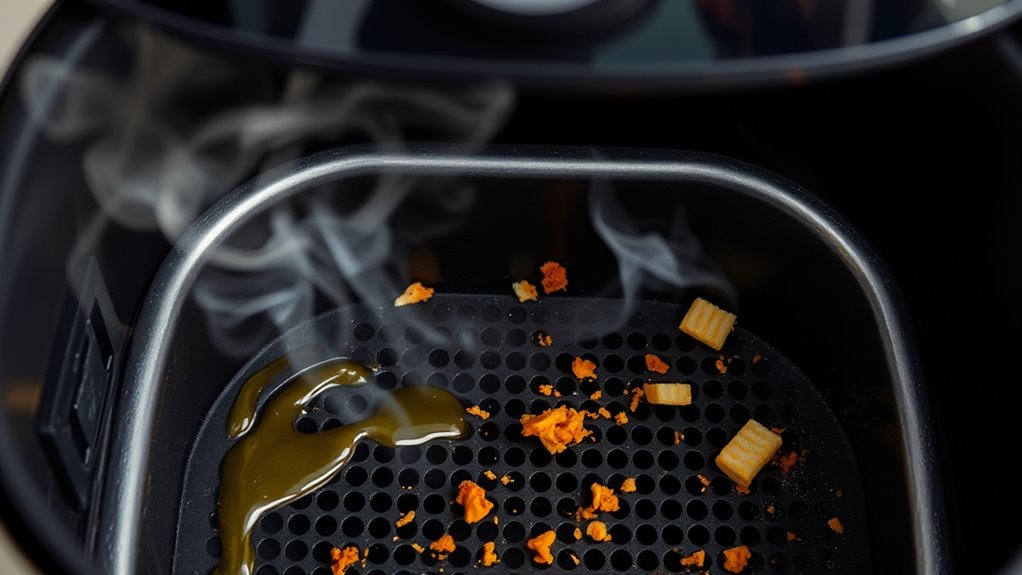
Residual oil and grease buildup is a common cause of smoking in your air fryer. Over time, small amounts of oil and grease from cooking can accumulate on the heating element and the interior surfaces. When the air fryer heats up, this residue can burn, producing smoke and an unpleasant smell. If you frequently cook foods with added oils or fats, the buildup happens faster. To prevent this, regularly clean the interior, especially the heating element and the tray, to remove any grease deposits. Avoid using excessive oil in your recipes, and wipe down surfaces after each use. Keeping your air fryer clean guarantees it operates efficiently and prevents smoking caused by residual oil and grease. Regular maintenance and understanding Vetted – Mad Tasting models can also help ensure optimal performance. Additionally, using proper cleaning techniques can make a significant difference in maintaining a smoke-free appliance. Proper air flow within the unit is also essential to prevent heat buildup that could cause smoking. Ensuring adequate ventilation around the air fryer during use can also reduce smoke issues and improve safety.
Food Particles and Spills Inside the Unit
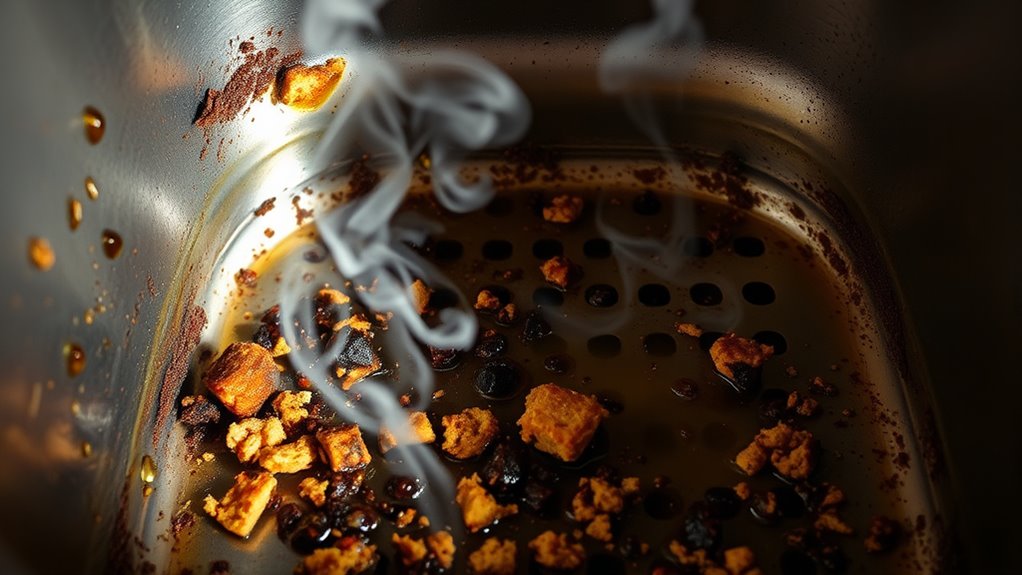
Food particles and spills often stay inside your air fryer, leading to smoke and burnt odors. If you don’t clean regularly, residue builds up quickly and can even cause fires. Keeping the interior tidy is key to preventing smoking and ensuring safe operation. Additionally, understanding the pinball machine weight can be useful when moving or installing your appliance to avoid damage. Regular maintenance and thorough cleaning help prevent residue buildup that contributes to smoke and odors inside the unit. Proper cleaning also reduces the risk of fire hazards, which can result from accumulated grease and food debris. Incorporating routine checks for food residue can further help in maintaining optimal performance.
Residue Buildup Causes Smoke
When food particles or spills aren’t cleaned thoroughly, they can accumulate inside your air fryer and cause smoke during operation. Over time, grease and tiny food bits stick to the heating element, the basket, or the interior surfaces. As the air fryer heats up, these residues burn, creating smoke and unpleasant odors. If you notice smoke, check for buildup on the heating coil and the bottom of the basket. Neglecting regular cleaning allows these residues to harden and become more difficult to remove. This not only causes smoke but can also affect your air fryer’s performance and lifespan. To prevent this, clean your air fryer after every use, paying special attention to areas where food often spills or settles. Additionally, proper maintenance of heating elements and surfaces helps ensure optimal air quality and prolongs the device’s efficiency. Regularly inspecting and cleaning the heating element can prevent the buildup that leads to smoking and improve your appliance’s longevity. Incorporating routine cleaning practices can further minimize the risk of smoke and ensure your air fryer operates safely. Staying informed about the best maintenance methods can help you avoid common issues and keep your appliance functioning smoothly.
Food Spills Accumulate Quickly
Spills and crumbs inside your air fryer can quickly build up if you don’t clean them promptly. When food particles fall or drip during cooking, they settle at the bottom or stick to the sides, creating a layer of debris. Over time, these residues trap grease and moisture, which can burn and produce smoke. If you don’t remove food spills regularly, they’ll become harder to clean and more likely to cause smoking during subsequent uses. Small spills might seem insignificant, but they can accumulate rapidly, especially with frequent use. Keeping your air fryer clean by wiping out spills after each use prevents buildup and reduces the risk of smoke caused by burnt food particles. Regular cleaning ensures smoother operation and better-tasting results. Additionally, neglecting to remove food spills can impact the filtration system, allowing debris and grease to circulate and potentially clog vents or filters over time. Proper maintenance of the air circulation system helps prevent overheating and ensures even cooking. Regularly inspecting and cleaning the ventilation components can further enhance performance and safety. Maintaining a clean interior also supports the air circulation, which is essential for even cooking and preventing overheating.
Regular Cleaning Prevents Fires
Regular cleaning of your air fryer is essential for preventing fires caused by unattended food particles and spills inside the unit. Leftover grease, crumbs, and food debris can build up over time, creating a fire hazard. When these residues are exposed to high heat, they can ignite unexpectedly. To minimize this risk, make it a habit to clean the basket, tray, and interior after each use. Use warm soapy water or a non-abrasive cleaner to remove grease and food residues thoroughly. Check for any hidden crumbs in corners or crevices. proper cleaning techniques are crucial to maintaining safety and efficiency. Regular maintenance not only keeps your air fryer safe but also guarantees it functions efficiently. Staying vigilant about cleanliness helps prevent smoke and potential fire hazards, giving you peace of mind during every cooking session. Additionally, understanding food particles and spills inside the unit can help you maintain your appliance more effectively.
High Cooking Temperatures
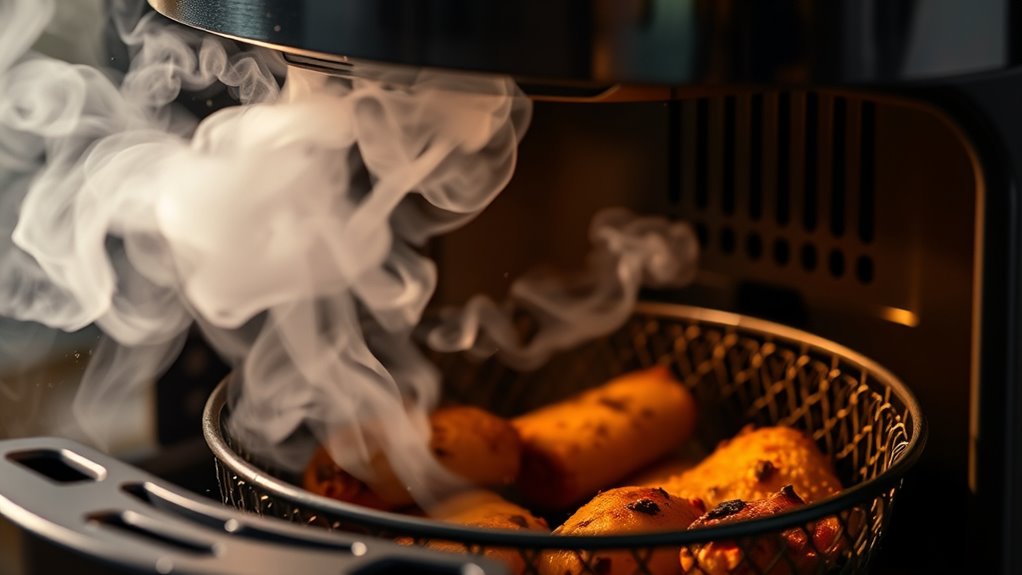
High cooking temperatures can cause your air fryer to smoke because the intense heat can lead to the breakdown of residual grease or food particles inside the appliance. When you set the temperature too high, any leftover grease from previous cooking sessions can vaporize quickly, producing smoke. Additionally, food particles that aren’t thoroughly cleaned can burn or char at elevated temperatures, causing smoke to fill your kitchen. To prevent this, stick to recommended temperature settings for different recipes and avoid cranking up the heat unnecessarily. Regularly cleaning your air fryer helps minimize leftover grease and debris. If you notice smoke during high-heat cooking, lower the temperature and give your appliance a quick clean to keep it functioning safely and efficiently. Proper maintenance and understanding of self cleaning mechanisms can also help reduce the risk of smoking during use. Being aware of cooking temperature guidelines can further help prevent smoke from occurring, and understanding how residual grease accumulates can help in maintaining a cleaner appliance. Additionally, ensuring good air circulation inside the unit can help dissipate heat and reduce smoke production.
Overcrowding the Basket
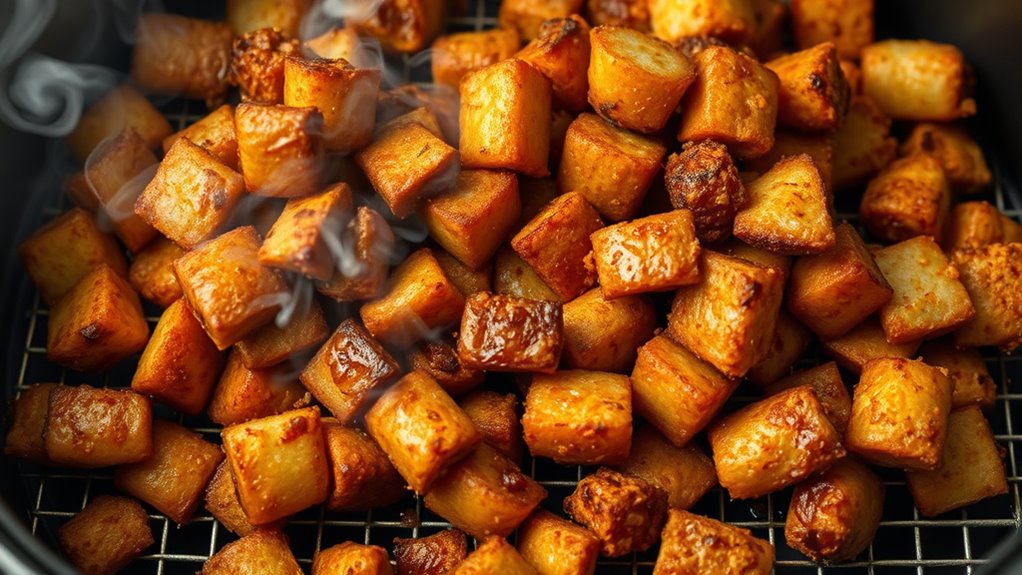
Overcrowding the air fryer basket can lead to smoking because it restricts proper airflow and causes food to cook unevenly. When you load too much food, grease and juices can accumulate, leading to smoke. To avoid this, keep these tips in mind:
- Fill the basket only halfway to ensure hot air circulates freely.
- Shake or turn food midway to promote even cooking.
- Use smaller quantities for larger cuts of meat or vegetables.
- Remove excess grease or drippings before cooking to prevent smoke buildup.
- Ensuring proper airflow management can help you better understand how to manage airflow and avoid common issues like smoking.
Using the Wrong Cooking Accessories
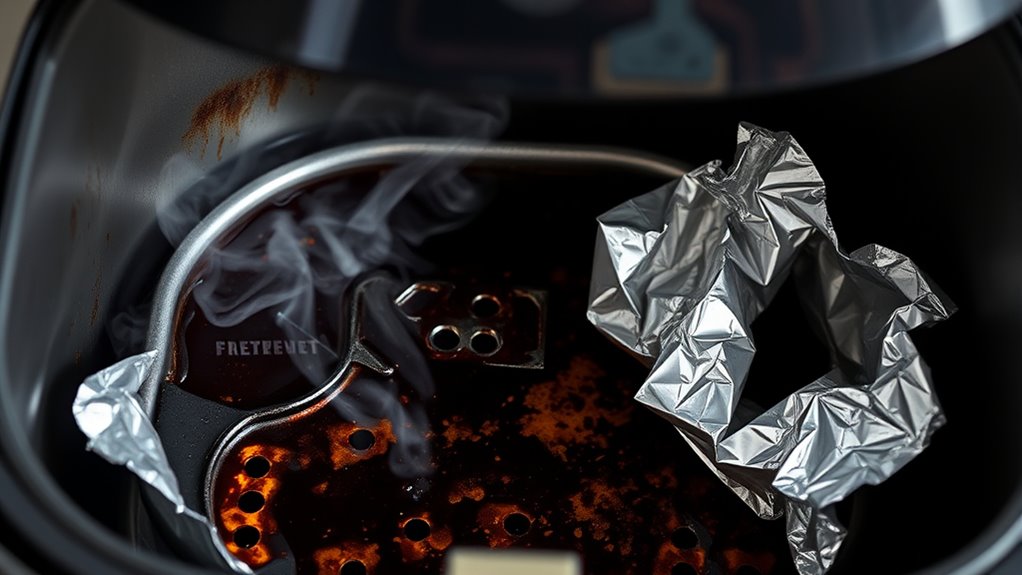
Using the wrong cooking accessories can cause your air fryer to smoke because incompatible or poorly suited tools can trap grease or block airflow. For example, using thick, nonperforated pans or metal cookware not designed for air fryers can trap grease and debris, which heats up and causes smoke. Similarly, using accessories made from materials that aren’t heat-resistant, like certain plastics or thin metals, can melt or release smoke. Always choose accessories labeled safe for air fryers, such as silicone mats or perforated trays. Avoid stacking multiple layers or using oversized pans that restrict airflow. Proper accessories promote even cooking and reduce smoke, keeping your air fryer clean and functioning efficiently.
Manufacturing Residues or Coatings
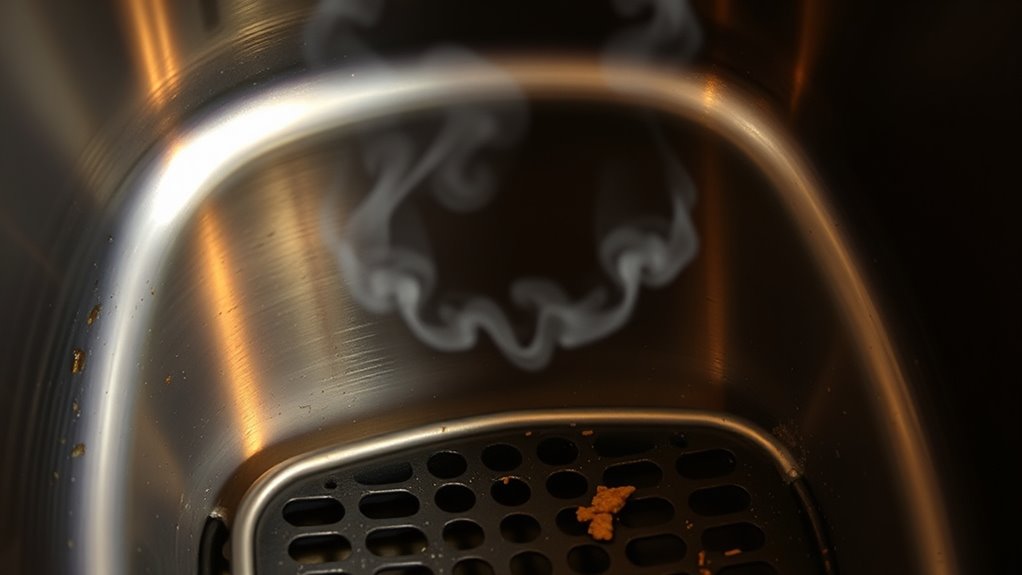
Manufacturing residues or coatings on your air fryer can cause it to smoke, especially if these leftover substances burn during use. These residues include manufacturing oils, protective coatings, or leftover packaging materials that weren’t fully cleaned off. To prevent smoking caused by residues, consider the following:
- Inspect the interior for any visible residues or coatings before first use.
- Wipe down all surfaces with a damp cloth to remove manufacturing oils.
- Run the air fryer empty at high heat for 10-15 minutes to burn off lingering substances.
- Check the manufacturer’s instructions for recommended initial cleaning procedures.
Addressing manufacturing residues ensures your air fryer operates cleanly and safely, preventing smoke caused by leftover substances burning during cooking.
Faulty or Damaged Heating Element
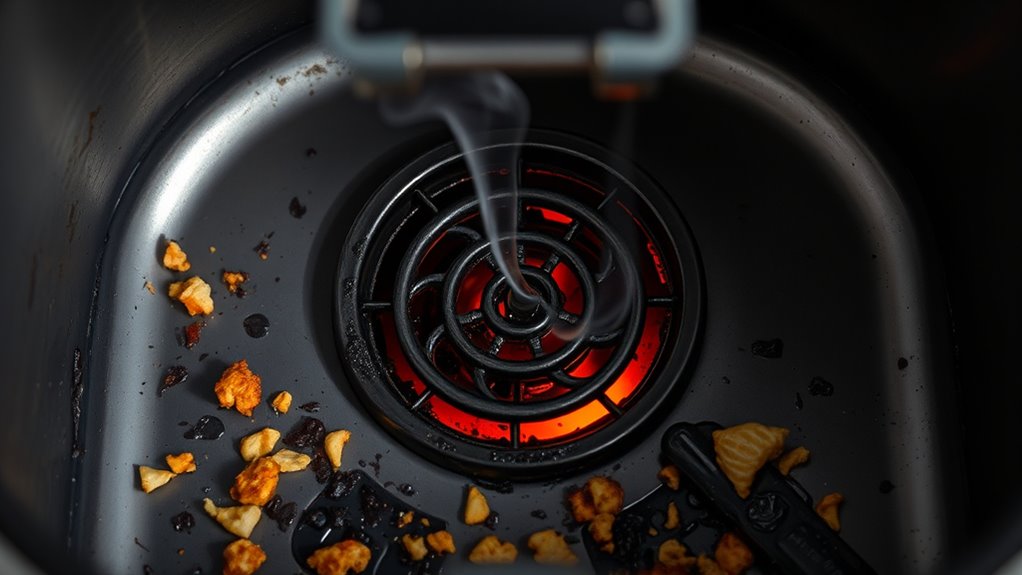
Even after cleaning manufacturing residues, smoking can still occur if the heating element isn’t functioning properly. A faulty or damaged heating element may overheat or produce uneven heat, causing excess smoke. If the element has cracks, corrosion, or burn marks, it’s a clear sign it’s failing. When the heating element doesn’t heat evenly, some parts may get too hot, burning food or grease buildup, which generates smoke. You might notice your air fryer’s performance declining, or it may turn off unexpectedly. Replacing a damaged heating element is essential to restore safe operation and prevent smoke. Always unplug your appliance before inspecting or replacing the part, and consider seeking professional repair if you’re unsure about diagnosing or fixing the issue yourself.
Improper Cleaning and Maintenance
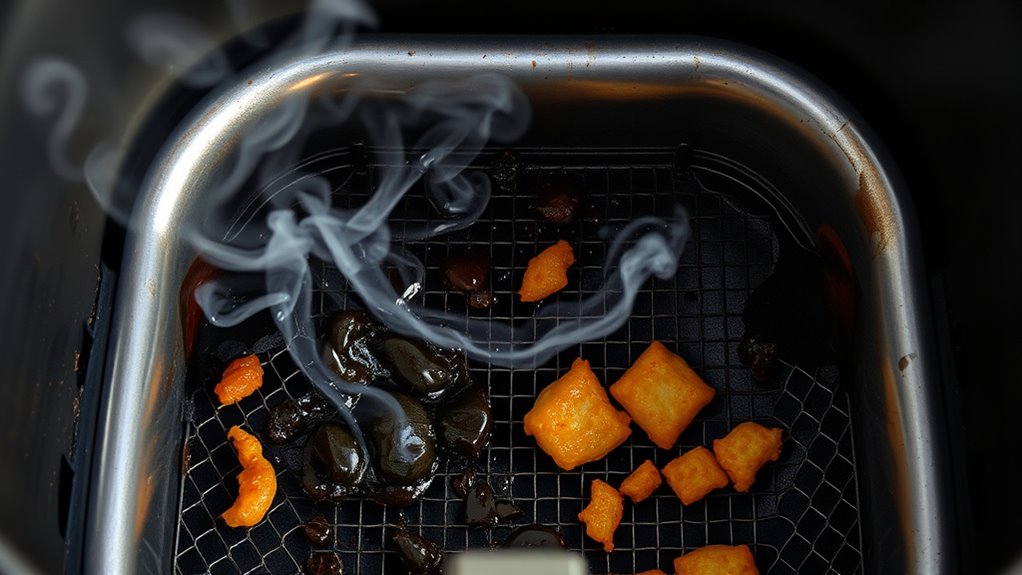
If you don’t clean your air fryer regularly, leftover food grease can cause smoking. A dirty heating element or blocked vents and drip tray can also lead to smoke and odors. Keeping these parts spotless ensures safe and efficient operation.
Residual Food Grease
Residual food grease often causes your air fryer to smoke when it isn’t cleaned properly. Over time, grease builds up on the basket and inside the unit, leading to smoke when heated. To prevent this, check these common issues:
- Grease pooling at the bottom of the basket.
- Sticky or burnt residue on the sides.
- Food particles sticking to heating elements.
- Poor cleaning after each use.
Failing to clean these areas allows grease to vaporize and smolder, causing smoke. Regularly remove and wash the basket and tray thoroughly. Wipe down interior surfaces with a damp cloth, paying close attention to corners. Proper maintenance keeps grease from accumulating, reducing smoke and extending your air fryer’s lifespan.
Dirty Heating Element
A dirty heating element is a common culprit behind smoking air fryers, especially when proper cleaning routines are overlooked. Over time, grease, food particles, and oil can accumulate on the element’s surface, causing smoke when heated. If you don’t regularly clean the heating element, these residues become a source of smoke during cooking. To fix this, unplug your air fryer and let it cool completely. Use a soft brush or cloth to gently remove grease and debris from the heating element. Avoid harsh abrasives or soaking the component. Regular maintenance not only prevents smoking but also prolongs your appliance’s lifespan. By keeping the heating element clean, you ensure your air fryer operates efficiently and safely, reducing smoke and potential fire hazards.
Blocked Vents or Drip Tray
Blocked vents or a dirty drip tray can cause your air fryer to smoke during operation. When vents are obstructed, hot air can’t circulate properly, leading to overheating and smoke. A dirty drip tray can accumulate grease and food debris, which can ignite or produce smoke when heated. To prevent this, follow these steps:
- Regularly check and clear vents of dust and debris.
- Clean the drip tray after each use to remove grease buildup.
- Ensure the tray is correctly positioned before cooking.
- Avoid overfilling the basket to prevent excess drips.
Keeping vents unobstructed and the drip tray clean improves airflow, reduces smoke, and extends your air fryer’s lifespan. Proper maintenance is key to safe, smoke-free cooking.
Malfunctioning Fan or Ventilation System
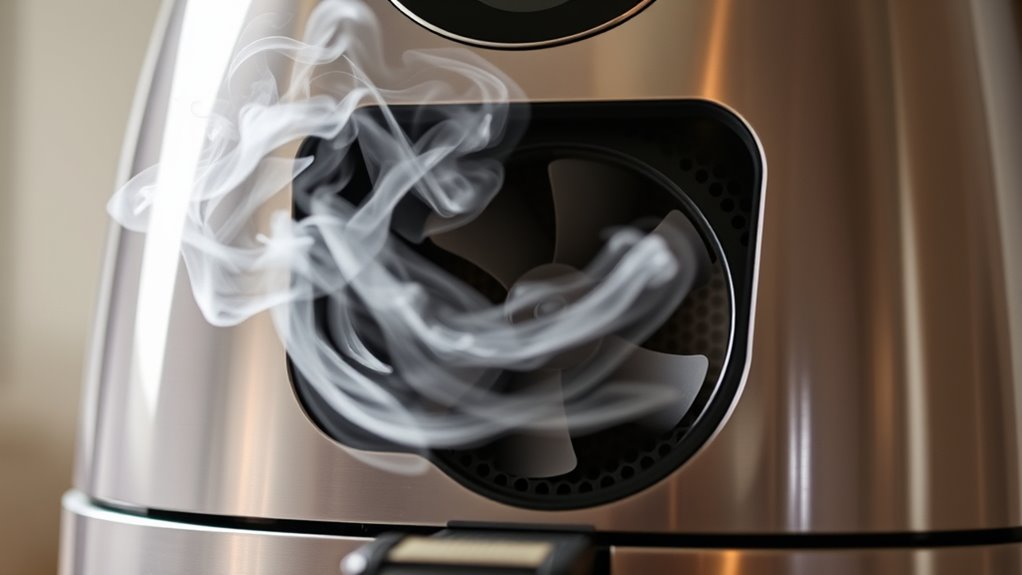
When your air fryer starts smoking unexpectedly, a malfunctioning fan or ventilation system might be the culprit. If the fan isn’t working properly, heat can build up inside, causing smoke and sometimes burning smells. You might notice the fan isn’t spinning or making unusual noises. Dust, grease, or food debris can clog the vents or fan blades, reducing airflow. Over time, the fan’s motor could fail, preventing proper cooling and ventilation. To fix this, unplug your air fryer and inspect the fan area for debris or damage. Clean any buildup carefully. If the fan appears broken or isn’t functioning after cleaning, you may need to replace it or have a professional assess the ventilation system. Proper airflow is essential to prevent smoking and ensure safe operation.
Electrical Issues or Short Circuits

Electrical issues or short circuits can cause your air fryer to smoke unexpectedly. When wiring is damaged or components malfunction, electricity can arc or overheat, leading to smoke. To identify potential problems, check these areas:
Electrical problems like damaged wiring or faulty components can cause your air fryer to smoke unexpectedly.
- Damaged Power Cord: Look for frays, cuts, or exposed wires that could cause a short.
- Internal Wiring: Inspect for loose or burned wires inside the unit.
- Control Panel Malfunctions: Faulty switches or circuits may create sparks or overheating.
- Overloaded Outlets: Plugging the fryer into an overloaded or incompatible outlet can cause electrical surges.
If you notice any of these issues, unplug the appliance immediately and consider professional repair or replacement. Ignoring electrical problems risks fire and further damage.
Frequently Asked Questions
Can Using Too Much Oil Cause My Air Fryer to Smoke?
Using too much oil in your air fryer can definitely cause it to smoke. When excess oil heats up, it can smoke and create a mess. To avoid this, use only a light coating of oil, and wipe away any excess before cooking. Properly managing the amount of oil helps prevent smoking and keeps your air fryer working efficiently and safely.
Does the Type of Food Affect Smoke Production in an Air Fryer?
The type of food you cook definitely affects smoke production in your air fryer. Fatty or greasy foods, like bacon or greasy meats, tend to produce more smoke because they release oils that can burn or vaporize. On the other hand, leaner foods like vegetables or chicken breasts usually produce less smoke. To minimize smoke, consider trimming excess fat and cleaning your air fryer regularly.
How Does the Age of My Air Fryer Influence Smoking Issues?
As your air fryer ages, it may develop smoking issues due to accumulated grease and food residue. Over time, these buildup can burn and produce smoke during operation. Regular cleaning becomes essential to prevent this. Also, worn-out heating elements or damaged components can cause overheating, increasing smoke. So, maintaining your air fryer by cleaning it frequently and replacing worn parts can help reduce smoking problems associated with age.
Can Improper Placement of the Air Fryer Cause Smoking?
Yes, improper placement can cause your air fryer to smoke. If you put it too close to walls or on uneven surfaces, heat can build up or airflow may be restricted, leading to smoke. Also, placing it near flammable materials or blocking the ventilation openings can cause overheating and smoke. Always guarantee your air fryer is on a stable, heat-resistant surface with proper clearance for safe operation.
Is It Normal for New Air Fryers to Emit Smoke Initially?
Many newcomers notice new air fryers emitting some smoke initially, which is normal. This is often due to manufacturing residues, excess oil, or protective oils burning off during the first few uses. You might see smoke as the appliance warms up. To minimize this, clean your fryer thoroughly before use, avoid over-oiling, and run it empty for a few minutes. Once broken in, smoke should subside, signaling safe, satisfying frying.
Conclusion
To keep your air fryer from turning into a smoky mess, stay vigilant with cleaning and avoid overloading the basket. Think of it like tuning a musical instrument—you need to keep all parts in harmony. Regular maintenance and mindful cooking habits will ensure your air fryer works smoothly and safely. With a little care, you’ll enjoy crisp, delicious meals without the smoke alarm joining the party.
